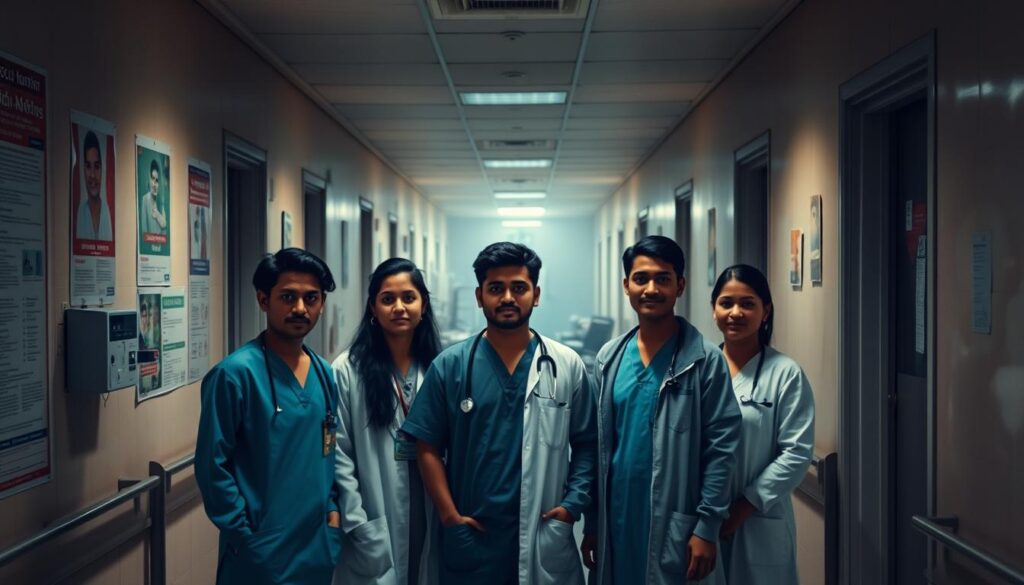What does it take to succeed in one of the most challenging exams for foreign medical graduates? The FMGE exam, with its rigorous standards, demands not just knowledge but also strategic planning and focused effort. With only 7,781 out of 37,827 candidates qualifying in the December 2023 session, the stakes are undeniably high.
For Indian candidates pursuing their education abroad, the journey to becoming a qualified medical graduate is filled with unique challenges. From adapting to a new educational environment to mastering a vast syllabus, the path is anything but easy. However, with the right guidance and resources, success is within reach.
In this guide, we explore the essential steps to excel in the FMGE exam while studying in Russia. We’ll discuss the importance of choosing the right university, understanding the exam pattern, and leveraging effective study techniques. Whether you’re just starting or nearing the exam date, this article is your roadmap to achieving your goals.
For those considering alternative paths, studying MBBS abroad without NEET offers a viable option. This guide also highlights the significance of accredited institutions and the role of structured coaching in ensuring success.
Understanding FMGE: Purpose and Importance
The FMGE exam plays a pivotal role in shaping the future of medical practice in India. It ensures that all doctors meet a consistent standard, safeguarding patient safety and maintaining quality healthcare. This standardized test evaluates the knowledge and clinical skills of foreign medical graduates, ensuring they are well-prepared to practice in India.
The Role of FMGE in Ensuring Quality Medical Practice
The exam serves as a critical filter, ensuring only qualified candidates join the Indian healthcare system. It bridges the gap between diverse education systems, creating uniformity in medical practice across the country. Competent faculty and quality education at reputable medical universities are essential for success in this rigorous test.
Questions in the exam are designed to assess both theoretical and applied medical knowledge. This comprehensive approach ensures that candidates are not only knowledgeable but also capable of applying their skills in real-world scenarios. The focus on quality assurance makes the FMGE a cornerstone of India’s healthcare standards.
Patient Safety and Standardization in Indian Healthcare
Patient safety is at the heart of the FMGE process. By filtering candidates through a standardized test, the exam ensures that only those with the necessary skills and knowledge can practice in India. This process minimizes risks and enhances the overall quality of healthcare services.
For those considering alternative paths, studying MBBS abroad at low cost offers a viable option. However, the importance of passing the FMGE remains unchanged, as it is the gateway to practicing medicine in India.
| Aspect | Details |
|---|---|
| Purpose | Ensure consistent medical standards |
| Focus | Patient safety and quality healthcare |
| Key Components | Theoretical and applied medical knowledge |
| Outcome | Qualified candidates join the healthcare system |
Exam Structure, Syllabus, and Application Process
The FMGE exam structure and application process are critical for every aspirant aiming to practice medicine in India. Understanding the format, syllabus, and steps involved ensures a smooth journey toward achieving this goal.
Detailed Overview of the Exam Pattern and Syllabus
The examination consists of 300 multiple-choice questions (MCQs) divided into two parts. Each part has 150 questions, with a time allotment of 150 minutes. The syllabus mirrors Indian MBBS standards, covering 19 compulsory subjects. These include Anatomy, Physiology, Biochemistry, and more.
Subjects are divided into two categories: Pre-Clinical and Para-Clinical. Each correct answer awards one mark, with no negative marking for incorrect responses. To qualify, a candidate must score at least 150 out of 300.
Online Registration and Admit Card Guidelines
The registration process begins in March each year. Candidates must visit the National Board of Examinations (NBE) website to complete the application. Key steps include filling out personal details, uploading documents, and paying the fee of Rs. 7080.
After successful registration, the admit card is issued in May. It includes essential details like the exam center, date, and time. Candidates must carry a valid photo ID and the admit card to the examination hall.
Step-by-Step Application Process for FMGE 2024
Here’s a clear guide to the application process:
- Visit the NBE website and create an account.
- Fill in personal and academic details accurately.
- Upload required documents, including a photograph and signature.
- Pay the application fee online.
- Review and submit the form before the deadline.
Choosing the right university and starting early can significantly impact your success. For those exploring other options, studying MBBS in Uzbekistan offers an affordable and globally recognized alternative.
Every aspirant should follow these steps meticulously to avoid last-minute challenges. Professional coaching and consistent study techniques can further enhance your chances of success.
Effective fmge preparation russia students Strategies
Mastering the strategies for success in this challenging exam requires a blend of discipline and smart planning. By adopting the right techniques, candidates can enhance their understanding and improve their chances of achieving high scores.
Early Preparation and Consistent Study Techniques
Starting early is crucial for building a strong foundation in medicine. Begin your studies during your MBBS program to align your knowledge with the exam syllabus. Consistent study habits, such as daily revision and focused practice, can significantly improve retention.
Breaking down the syllabus into manageable sections helps in better time management. Allocate specific hours for each subject and stick to a disciplined schedule. This approach ensures comprehensive coverage of all topics.
Bridging Curriculum Gaps and Overcoming Language Barriers
The curriculum differences between foreign MBBS programs and the exam requirements can be challenging. Focus on bridging these gaps by identifying key areas that need extra attention. Use additional resources to strengthen your understanding of critical subjects.
Language barriers can also pose difficulties. Practice reading and writing in the exam’s language to improve fluency. Joining study groups or online forums can provide additional support and clarity.
Utilizing Mock Tests and Professional Coaching
Mock tests are invaluable tools for self-assessment and time management. Regularly taking these tests helps simulate the exam environment and identifies areas for improvement. Analyze your performance to refine your study plan.
Investing in professional coaching can provide structured guidance and expert insights. Coaches can help you navigate the complexities of the syllabus and offer tailored strategies. For those considering pursuing an MBBS degree in Russia, coaching can bridge the gap between international education and exam requirements.
Balancing the fee for coaching with other resources is essential. Prioritize quality education and utilize available tools to maximize your preparation. A rigorous approach that combines theory and practice will set you on the path to success.
Challenges and Opportunities for Indian MBBS Graduates in Russia
Indian medical graduates studying abroad often face unique challenges that test their resilience and adaptability. From navigating substandard university environments to leveraging cultural diversity, the journey is both demanding and rewarding. Understanding these dynamics is crucial for achieving long-term success in the medical field.

Navigating Substandard University Environments and Limited Support
One of the primary challenges is the disparity in educational quality. Some institutions may not meet the standards expected by the Indian state medical system. This can lead to gaps in knowledge and difficulty in aligning with the exam pattern required for practice in India.
Limited institutional support further complicates the journey. Students often struggle with inadequate resources, language barriers, and a lack of guidance. Building a robust support system, whether through peer networks or professional coaching, can help bridge these gaps.
Leveraging Cultural Diversity and Enhanced Clinical Exposure
Despite the challenges, studying abroad offers unique opportunities. Exposure to diverse cultures broadens perspectives and enhances interpersonal skills. This cultural adaptability is invaluable in the global medical field.
Clinical exposure in international settings provides hands-on experience with a variety of medical conditions. While tropical diseases common in India may not be prevalent, the diverse clinical training equips graduates with a well-rounded skill set. Institutions like Perm State Medical University offer modern facilities and comprehensive training, making them ideal choices for aspiring doctors.
Understanding the syllabus and adopting a strategic study plan can counterbalance institutional shortcomings. By focusing on quality education and leveraging available resources, students can transform challenges into stepping stones for long-term success in medicine India.
Conclusion
The journey to becoming a qualified medical professional is both challenging and rewarding. Throughout this guide, we’ve highlighted the importance of understanding the curriculum and exam pattern to achieve success. A well-planned course of study during your MBBS program directly influences your ability to excel in the licensing process.
Obtaining a degree recognized by Indian medical authorities requires relentless practice and structured preparation. Investing in quality coaching and mock tests can significantly enhance your assessment skills. Medical education abroad, when paired with informed planning, paves the way for a rewarding career in Indian healthcare.
For those pursuing their studies abroad, staying updated with the latest NMC guidelines is crucial. With the right approach, every aspirant can overcome challenges and achieve outstanding results.




